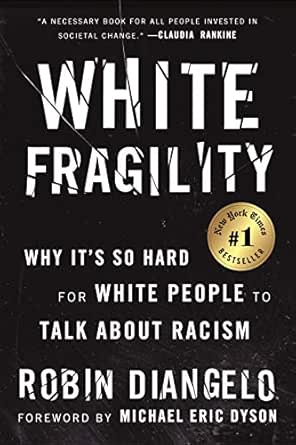I read this best-selling book as part of a book club assignment. As books and conversations about race and racism are finding a large audience at this time, I hope that such things are able to effect real change. I suspect, however, that racism, and our attitudes about it, will continue to evolve into yet other different forms rather than disappear. The current manner in which racism continues to manifest itself in a systemic way is difficult to assess critically. Color blindness is on some level an ideal (often touted by conservatives) and on another a way to continue the exploitation of people of color (as often claimed by liberals). (As Diangelo and others would say of color blindness: coded "nonracial" language often suits a racially charged purpose; and when someone starts off with advantages, such "blindness" actually perpetuates the current system rather than interrogating it.) On the other side, appreciation of differences between cultures and ethnicities is an ideal (assuming such differences exist), until such "appreciation" becomes a means to set certain peoples aside as something "other" for supremacist purposes. I'm reminded of something a friend once said to me when I was a young man that has stuck with me forever after, namely, that we humans always find people to discriminate against for our own ends. If a society consisted only of white males, that society would find a way to distinguish among them so as to more greatly advantage some over others (height, weight, hair or eye color, etc.), merit aside (though what consistutes merit can also be loaded for particular ends); as such, racism, like all forms of discrimination or manifestations of inequality, is not easily resolved.
Diangelo's book looks at the ways that racism persists in society today, at how it advantages white people, and at how white people try to avoid discussing it. Diangelo's book has a very specific definition of racism that doesn't necessarily fit with the ways in which other people might use the term. Prejudice is a bias against others; discrimination applies that bias against others. Anyone can be prejudiced or discriminatory. Racism, by contrast, has to do, in Diangelo's usage, with systemic discrimination; as such, only those who are privileged are able to demonstrate and live in racist ways--namely, whites.
The system into which humans are born places whites at an advantage in the manner in which whites are treated by others (and by the system itself) and in the assumptions that are made about people. Certainly, class and other different social strata have their effects, but when we talk purely about the color of skin, whites have advantages. Furthermore, whites often refuse to talk about those advantages or to acknowledge them. Coded language is one way whites avoid such conversations. Another way is that whites claim that they are being attacked if someone shows them that they have said something that is discriminatory. These self-defense mechanisms keep racist tropes and practices--and by extension the racist system--in place. Learning to listen to others is a key to overcoming such ingrained behaviors, as is humility and constant self-examination.
Diangelo's book didn't really bring anything to my attention I wasn't already aware of, but it did do a great job of making me as white person feel uncomfortable, which in a way is a good thing, since that's kind of the point--to make whites think about everyday things in ways whites perhaps don't like to acknowledge.







No comments:
Post a Comment